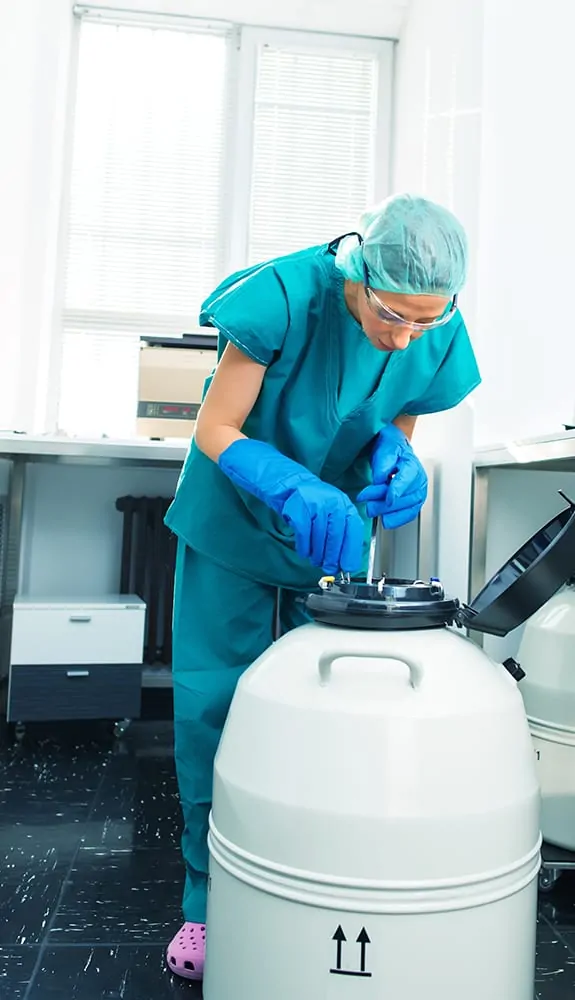What is sperm and oocyte/egg cryopreservation? Learn more about what cryopreservation is and why it is commonly used in fertilty treatments.
Gametes (sperm and egg) can undergo cryopreservation (freezing) for long term storage. Infection screening for Hepatitis B, Hepatitis C and HIV is required prior to the storage as affected sperm samples are stored separately in order to prevent contamination.
Sperm cryopreservation
Semen cryopreservation is a procedure to preserve sperm cells so a man can try and have a child later and hopefully become an older father. There are different reasons for storage of semen samples. Some men who do not have sperm in an ejaculated semen sample can have sperm retrieved following a surgical collection and stored depending on the quality of the sperm.
Men with a low sperm count may consider freezing and storing sperm as the sperm quality may deteriorate over time.
Other men have a psychological barrier to give a sperm sample on the day of egg collection and having frozen sperm can take the pressure away and give a security that there will be sperm available on the day of egg collection for fertility treatment.
Sperm storage is also offered to men before undergoing cancer treatment as some treatment can have an impact on future fertility by damaging the cells in the testicles that make sperm. This can also apply to teenagers.
Some men are happy to donate sperm for the use of other women or couples. The donated sperm is frozen until future usage.
Fertility treatment in the form of IVF (in vitro fertilisation)/ICSI (intracytoplasmic sperm injection) using frozen sperm is as successful as IVF using fresh sperm. It is important to know that not all sperm will survive the thawing process.
Oocyte/egg cryopreservation
Oocytes are cryopreserved using a procedure called “vitrification”.
Women undergoing fertility treatment with hormonal medication produce several follicles in the ovary and multiple eggs get collected. If embryo storage is not feasible, egg freezing of “surplus” eggs can be offered. The ovarian stimulation and egg collection procedure are the same as standard IVF treatment.
Storage of gametes is no longer reserved for preservation of male fertility but is also an option for women who wish to preserve their fertility for medical- or age-related fertility loss. More reproductive age women are surviving cancer. However, many anti- cancer treatments are harmful to ovaries. Some women are able to postpone treatment and have a round of ovarian stimulation in order to collect eggs for either egg storage only (oocyte cryopreservation without fertilisation) or fertilisation with sperm and subsequent embryo cryopreservation.


Thawing of vitrified embryos/eggs has a 90% survival rate, meaning that not all the recovered eggs or the embryos that are produced, will survive the freeze/thaw process. Egg storage is ideal for women who do not have a male partner or sperm donor at the time of ovarian stimulation.
Young women may wish to delay motherhood and store their eggs while they find the right partner, pursue their career or feel that they are ready to have children. The eggs can then be used for assisted reproductive treatment in the future, but it is important to bear in mind that there is no guarantee that egg storage will lead to a live birth.
The most important factor that affects success rates of egg freezing is the age of the women at the time of freezing. Live birth rates from pregnancies that have come about by a woman using her own frozen eggs for treatment are increasing, but remain lower than treatments where the eggs are used ‘fresh’ (i.e. haven’t been frozen first, 19% in 2017 vs. 36% in fresh treatment cycle- UK HFEA data).
Eggs that have been frozen and thawed will undergo ICSI treatment as the outer coating of the egg is hard and it makes it difficult for the sperm to enter the egg under IVF treatment.
The long-term storage of eggs however is safe and doesn’t appear to cause genetic problems. It is reassuring that embryos derived from long term stored eggs show no differences in the rates of obstetrical problems in pregnancy compared to embryos from fresh eggs. However, when the woman is getting older, there is more risk of health problems and pregnancy related complications. There are no increased risks of significant physical or developmental deficits in the babies born from frozen eggs.
You can read more about the freezing of eggs and embryos here.


